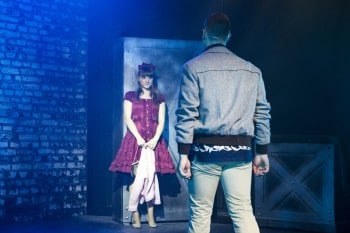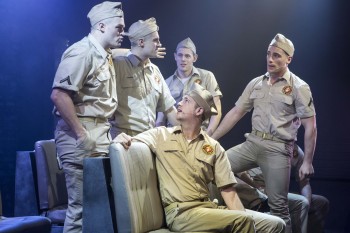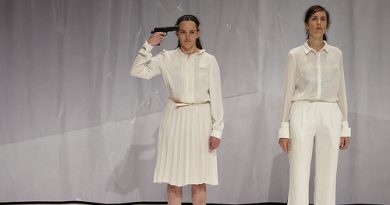Review: Dogfight — Hayes Theatre Co
Dogfight, with a book by Peter Duchan and music and lyrics by Benj Pasek and Justin Paul, premiered off-Broadway in 2012. Now having its Australian premiere at the Hayes Theatre in Sydney, it’s a perfect example of a contemporary musical adopting strong classical structure and ideas to tell a new, moving story.
There’s a classic flashback framework in place but for the most part, it’s 1963 and three new, young Marines are shipping out tomorrow – to Okinawa, and then on to Vietnam and into the controversial war.
But that’s tomorrow, and for their last free night they’re in San Francisco, and they’re determined to have a great time. They’re the ‘Three B’s’ – Birdlace (Luigi Lucente), Boland (Toby Francis) and Bernstein (Rowan Witt) – and they, along with their buddies, are going to have a dogfight.

A dogfight is when a group of guys kick in a bunch of money, see who can bring the ugliest girl out, and the guy who manages to have brought the biggest ‘dog’ wins the pot. The Lounge Singer (Mark Simpson, who plays a variety of roles and all of them with panache) sings something croony and manage to make it thoroughly lascivious, holding up scores that decide which woman is the worst in this hyper-competitive, hyper-brutal world. It’s as disgusting as it sounds and, to the show’s immense credit, it never once shies away from the ugliness and casual cruelty of the game.
And what a game it is. Boland breaks the rules and rents a sex worker Marcy (Johanna Allen); Bernstein doesn’t even know how to dance with Ruth Two Bears (Emily Havea) but he can nail a good, racially insensitive remark to even it out; but Birdlace runs into Rose Fenny (Hilary Cole) at her mother’s diner, and he finds the heart of the show in her, this awkward, endearing, socially removed songwriter who is full of kindness, a sort of hopeful compassion Cole skilfully threads with the tiniest hint of steel.
We learn this about Rose slowly over the course of the show, once the horrible business of using, objectifying, and taunting these women (not to their faces, of course), is over – it starts to show when Marcy encourages Rose to find her strength and use it (in a number, “Dogfight”, that is charged with emotion and compellingly sung by both Allen and Cole).

Rose has a bad haircut and bad skin and slumps. Rose has no confidence, and hides her differences from the world. Rose feels undesirable, so she becomes, to most, undesirable. But Rose also listens to “This Land is Our Land” and “We Shall Overcome”. Rose wants to know why war is a chosen solution for conflict at all the time when, to her, it doesn’t seem to work. Rose thinks, and challenges, and she might be sweet but she’s nothing insubstantial, and something about that catches Birdlace’s attention. Maybe it’s her unflinching honesty. Whatever it is, soon we all see her, really see her.
Rose and Birdlace cross paths again on his last night, and it leads to a particularly affecting finale, with high emotion that never feels unearned.
High emotions, high stakes. These boys – these boisterous, boys-will-be-boys kind of boys – are a direct result of their surrounding society, community, and family. They are Marines, the best of the best (they’ve been told) signing up fearlessly for war, greater than everyone else. Carrying on the traditions of their fathers and liberally fed promises of glory, parades, and sickening entitlement.
On the other hand, they are also Marines. They’ve been through 13 weeks of training, the kind that’s designed to break you down and rid you of pesky human weaknesses like empathy and compromise. They have been conditioned out of anything, really, that isn’t being right, taking control of a situation, and knowing that they are the best damn thing to happen to anyone. A patriarchal society that prizes this kind of manliness hurts the men as much as it hurts women like those exploited by the dogfight; it’s a painful, damaging cycle, a step removed from humanity.
In moments, under Neil Gooding’s clear-eyed, unhurried direction, and guided by cues in the book and lyrics, it’s quite heartbreaking. The boys are cruel because they’ve been shaped into something that isn’t just what they might be outside the military complex; that is, a bunch of lads. And we’re treated to a trio of standout performances. Toby Francis’ Boland is a wall of testosterone, hard and something dangerous, no matter how fiercely he clings to his other ‘Bs’, and even secretly-sensitive Eddie Birdlace (Lucente has a careful line to tread and he largely pulls it off) is immediately understood as volatile and potentially threatening.

But rounding out their trio is Rowan Witt’s Bernstein, the good kid, the naïve, affable kid, the little brother figure who, you think, probably couldn’t hurt a fly. It’s the biggest shock of all when he unleashes his own nasty side, and Witt manages that transition from goofball to aggressor perfectly; it’s a fine piece of acting that leaves a real mark on the show. No one is untouched by a forgiving culture of militant masculinity, not even the boy next door.
It’s a very strong musical – the music (led extraordinarily well in this production by musical director Isaac Hayward) borrows its harmonies from sixties pop, mostly (with a lovely lean towards folk for Rose, the music of her choosing), but it doesn’t feel dated; Pasek and Paul are great at twisting the old with a fresh hand into something that feels new, and it’s easy to see why songs from the show have escaped out into the wider musical theatre student and cabaret lexicon.
Gooding is a very fine director of musical theatre because he has a great internal understanding of the form and its various quirks. He’s very good at (with choreographer Camilla Jakimowicz, because movement and ease of the shit between movement and dance is crucial) bridging the gap between naturalistic, emotionally-charged dialogue and the inner truth of shifting into song. He has a handle on that ‘push’ that justifies a song the moment the first note is sung; he seems to find a genuine and honest quality of each of his actors, uniting him in each different musical’s universe as a world-builder. It’s a large part of the reason why Dogfight, with a not-insubstantial book and a weighty subject matter, strikes an even, appealing tone at the Hayes, with appropriate gravitas. (It is not often that a musical has gravitas, but this production does).

The score is invigorating, the simple but effective set dominated by an evocative scrim (design by James Browne and Georgia Hopkins), and the show is so well-cast that it’s brought to vivid, assured life – there’s not a single vocal weak link and the performances are uniformly impressive.
Allen’s powerhouse vocals are channelled with hard-hitting focus into “Dogfight”, though she then turns in her dual role to fall into the haunting simplicity of “Give Way” and its reprise with the rest of the cast in a way that sounds perfectly effortless. Lucente has a leading man voice, assured and full and rich with a vulnerable twinge, like something could crack if he reaches inside too far and hits the right nerve, and that’s what we need from him, and from Eddie Birdlace.
But Hilary Cole as Rose, the centre of the show, presents an incredibly nuanced performance that brings layered maturity, sensitivity and generosity into her voice. When she sings “Pretty Funny”, it’s a low moment for Rose, but Cole never takes it too far into maudlin. It’s remarkable how Cole can be so measured and complex without ever feeling measured; there’s an authenticity and warmth to her that’s completely irresistible, and there seems to be no end to her promise.
Dogfight is a show that doesn’t compromise. It is smart. It has an intelligent book and insightful, energising lyrics, set to a strong, solid score that is difficult to forget. At the Hayes it is elegantly produced, sensitively directed, and performed at the highest level. It is an excellent production of a very good show. It will steal your heart. It may even heal it.




